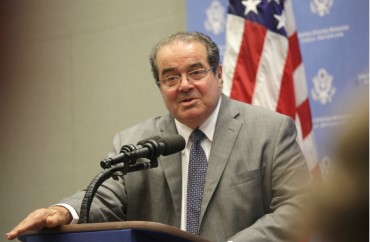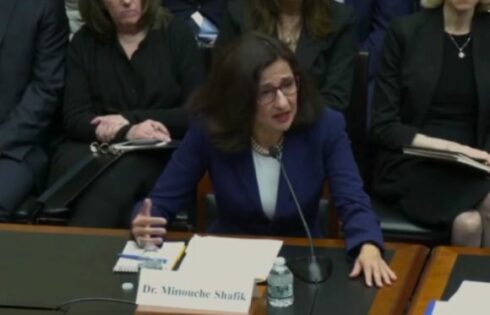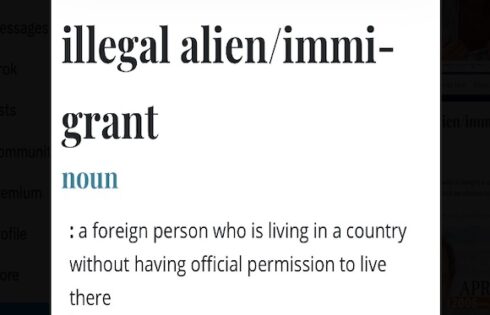
The Supreme Court heard oral arguments Wednesday in its second hearing of Fisher v. University of Texas, an affirmative-action case that could undo the precarious consensus from 2003’s Grutter decision.
Education scholars who thought Justice Anthony Kennedy might draw the line at ruling a minimally race-conscious program unconstitutional – UT-Austin’s program considers race for about 20 percent of open slots – must have been disappointed to see Kennedy essentially stalling for time.
As The New York Times reported, Kennedy “almost certainly holds the crucial vote and has never voted to uphold an affirmative action plan”:
[He] spent almost all of his time exploring whether the university should be allowed to submit more evidence to justify its use of race in accepting students. …
“The litigants, and frankly this court,” he said, “have been denied the advantage and the perspective that would be gained if there would be additional fact-finding.”
Late in the argument, though, he seemed to back off the idea.
“All of the colloquy so far indicates to me,” Justice Kennedy told [UT lawyer Gregory] Garre, “that if you had a remand, you would not have put in much different or much more evidence than we have in the record right now.”
Dahlia Lithwick of Slate thinks Kennedy is stalling until his more-conservative elderly peers retire:
He starts to toy with the project of sending it back to the trial court for a full airing of all the facts and issues. You can almost hear some of his colleagues’ eyes rolling as they consider the fact that almost half of them are over 70 and he seems to be planning on simply running out the clock.
But what really shocked observers was Scalia’s comments. As NYT reports:
In a remark that drew muted gasps in the courtroom, Justice Antonin Scalia said that minority students with inferior academic credentials may be better off at “a less advanced school, a slower-track school where they do well.”
“I don’t think it stands to reason that it’s a good thing for the University of Texas to admit as many blacks as possible,” he added.
The Week has the full quote from Scalia, where he makes clear he’s citing a friend-of-the-court brief that claims most black scientists went to a “less advanced school” (in Scalia’s clunky words).
Presumably it’s better that black students finish a degree at a mid-tier school and join the white-collar workforce rather than drop out of an elite school, saddled with debt and ashamed that they couldn’t pull it.
Gail Heriot, a University of San Diego law professor, made this point in a Wall Street Journal op-ed in October: Black students who do succeed in science and engineering tend to have graduated from historically black schools, whereas those at elite schools have transitioned into “softer majors” because “they took on too much, too soon given their level of academic preparation.”
One UCLA law professor, Richard Sander, wrote an entire book about the phenomenon he dubbed “mismatch.”
And black leaders went so far as to criticize President Obama a couple years ago for stiffing black students on loans that they were often using to attend those historically black schools.
RELATED: Blame affirmative action for the dearth of black scientists, law professor says
It’s kind of insulting when you think about it: Progressive educators from UT-Austin through the entire academy have been extolling the virtues of diverse classrooms at the highest levels of academia, seemingly uninterested in whether these environments actually help those minority students at greatest risk for giving up.
In order for those students to feel less isolated, elite schools would have to flat-out institute quotas and largely ignore conventional academic performance – and unless they go after the wealthy contingent among lower-performing students, then find a way to pay for a glut of lower-income, academically unprepared students who need massive remedial help.
RELATED: Affirmative action hurts students it’s intended to help, UCLA law professor argues
Scalia may be one of the few people in elite America willing to say that absolving white guilt shouldn’t be a higher priority than directing students to those institutions where they have the best chance of succeeding.
Not because they are inherently inferior – but because, like trying to learn Spanish at 30, students will face an unavoidable disadvantage in college admissions if they haven’t been well prepared for it many years prior, by the school system, neighborhood, parents and other role models.
RELATED: Black Leaders Say Obama Hurts Black Students’ College Careers
Like The College Fix on Facebook / Follow us on Twitter
IMAGE: United States Mission Geneva/Flickr






Please join the conversation about our stories on Facebook, Twitter, Instagram, Reddit, MeWe, Rumble, Gab, Minds and Gettr.